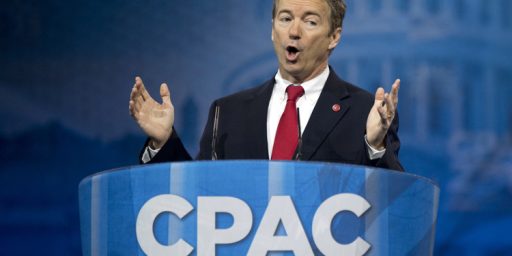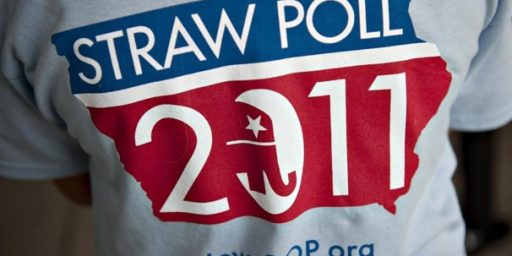Bush Using Straw-Man Arguments?
YahooNews and others are highlighting a piece on the AP wire by Jennifer Loven entitled, “Bush Using Straw-Man Arguments in Speeches.” Loven is presented as a “writer” and the piece is in no way labeled as an op-ed or even an “analysis,” thus giving the impression this is simply news rather than opinion.
“Some look at the challenges in Iraq and conclude that the war is lost and not worth another dime or another day,” President Bush said recently.
Another time he said, “Some say that if you’re Muslim you can’t be free.”
“There are some really decent people,” the president said earlier this year, “who believe that the federal government ought to be the decider of health care … for all people.”
Of course, hardly anyone in mainstream political debate has made such assertions. When the president starts a sentence with “some say” or offers up what “some in Washington” believe, as he is doing more often these days, a rhetorical retort almost assuredly follows. The device usually is code for Democrats or other White House opponents. In describing what they advocate, Bush often omits an important nuance or substitutes an extreme stance that bears little resemblance to their actual position. He typically then says he “strongly disagrees” — conveniently knocking down a straw man of his own making.
Bush routinely is criticized for dressing up events with a too-rosy glow. But experts in political speech say the straw man device, in which the president makes himself appear entirely reasonable by contrast to supposed “critics,” is just as problematic. Because the “some” often go unnamed, Bush can argue that his statements are true in an era of blogs and talk radio. Even so, “‘some’ suggests a number much larger than is actually out there,” said Kathleen Hall Jamieson, director of the Annenberg Public Policy Center at the University of Pennsylvania. A specialist in presidential rhetoric, Wayne Fields of Washington University in St. Louis, views it as “a bizarre kind of double talk” that abuses the rules of legitimate discussion. “It’s such a phenomenal hole in the national debate that you can have arguments with nonexistent people,” Fields said. “All politicians try to get away with this to a certain extent. What’s striking here is how much this administration rests on a foundation of this kind of stuff.”
The piece is deep in unintended irony. Aside from the fact that one can indeed point to mainstream Democrats who argue those points (see Jeff Goldstein and Dave Price) or that such rhetorical slights of hand are as old as politics and hardly unique to Bush or the Republicans (see Dan Riehl), Loven uses the same tricks in the very piece that condemns their use!
Of course, hardly anyone in mainstream political debate has made such assertions.
“Of course” combines several logical fallacies in one phrase: Appeal to Ridicule, Begging the Question, shifting the Burden of Proof, and Poisoning the Well.
“hardly anyone” is misleadingly vague and allows the author to dismiss counterexamples. Indeed, it admits that some people do in fact assert that–which, as Goldstein notes, is all the president claims–while trivializing them. So, one can say, “But Howard Dean, John Murtha, Dennis Kucinich, Al Frankens, John Kerry . . . .” and Loven can say, “Yeah, but that’s hardly anyone.”
“. . . in mainstream political debate. . .” Similar to “hardly anyone.” Is John Murtha in the mainstream? Howard Dean? Michael Moore? Moveon.org? DailyKos?
. . . Bush can argue that his statements are true in an era of blogs and talk radio.
Surely, it would have been easier to make misleading statements and get away with them before said eras? After all, it’s not just Bush sympathizers that have blogs and radio shows.
Even so, “‘some’ suggests a number much larger than is actually out there,” said Kathleen Hall Jamieson, director of the Annenberg Public Policy Center at the University of Pennsylvania. A specialist in presidential rhetoric, Wayne Fields of Washington University in St. Louis, views it as “a bizarre kind of double talk” that abuses the rules of legitimate discussion.
This is a classic Appeal to Authority with a nice Hasty Generalization thrown in. Do journalism professors have some special insight into the meaning of the word “some”? Jeff Goldstein looked it up in the dictionary. Why isn’t he quoted? Regardless, are we to conclude from the fact that two “experts” — both of whom, I would wager, voted for Bush’s opponents in 2000 and 2004 — believe Bush’s speeches are sometimes misleading that this is some sort of consensus view among “experts?”
Does President Bush try to score cheap political points in his speeches by painting the views of the opposition in ways in unfavorable ways? Sure. Are some of the instances cited in this piece valid examples of that practice? Probably. But to put this out as a “news” piece and then cite rhetoric experts as if they are shocked by this without giving any context is the worst form of journalistic hackery. Jamieson and Fields would almost certainly admit that Bush’s opponents — and indeed virtually everybody who gives persuasive speeches to large, non-specialized audiences — does the same thing. That’s especially true of politicians talking to friendly, partisan crowds.
That ain’t “news.”




This was part of his plan on “bringing honor and dignity back to the White House.”